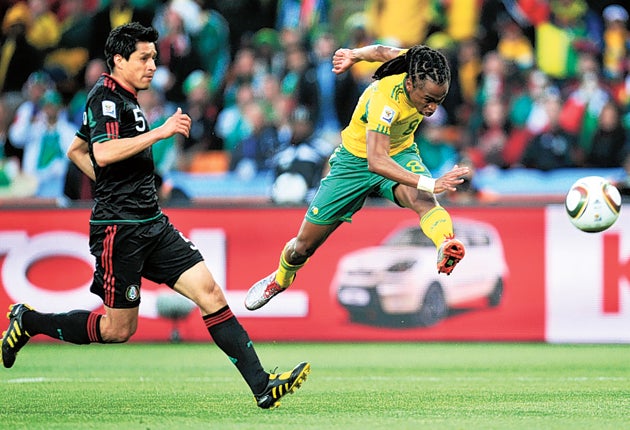Sound of history brings hope to the football team and a nation

It was the sound of South African history. More than 50,000 vuvuzelas trumpeting a wind of change and unity in Soccer City as South Africa got the continent's first World Cup off to an exciting and entertaining start.
You are going to get accustomed to hearing that chain-saw hum over the next month. You are going to be beguiled by the zest of the Rainbow Nation's supporters, who really do appear to have come together once more 20 years after Nelson Mandela's long walk to freedom.
What a pity Mandela could not be there to have seen Siphiwe Tshabalala rifle home the superb left-footed goal which gave the host nation the lead in a 1-1 draw against Mexico. A strike which will go down in a month's time as one of the most memorable of this 19th World Cup.
That was one sadness on an emotional opening day which began with South Africa's 91-year-old former president learning his great-granddaughter, Zenani, had died the night before in a car crash.
The Fifa president Sepp Blatter pitched it just right when he proclaimed to the 90,000 crowd moments before kick-off: "A dream came true, even if he is not here tonight the spirit of Mandela is in Soccer City."
So it was. There in the way South Africa dug in after the nerviest of starts. There in the way they warmed to their task and grew as the game went on, surviving a scare when Mexico had the ball in their net only for the attempt to be ruled offside.
There in the way they defied the Fifa statistics which say they are the 83rd-ranked team in the world while Mexico are the 17th.
Well it did not look that way. Mandela would have been proud of such stout resistence. He would have applauded the fearlessness with which Bafana Bafana wrested the authority from the Mexicans. He would have delighted in the verve of their attacks and the way they played neat and tidy football in the finest traditions of the beautiful game.
Most of all he would have nodded his approval at the ceaseless stream of noise from the stands. Host nations so often take inspiration from the passion of their support. And that was the case in Soccer City even if South Africa could not manage to prise the victory which would have given them real hope of surviving their group. The tournament needs that.
But whatever happens from now on – and it is a tough group including Uruguay and France – they will always remember the first day, which began with a wonderfully warm opening ceremony, full of energy, exploding with colour, packed with African culture and urban music.
The Nobel laureate Desmond Tutu, who believes the World Cup will do more to bring South Africa together than the Springboks' victory at the 1995 Rugby World Cup, was up on his feet dancing along.
It was a ceremony for all ages with the emphasis on friendship and hospitality at a venue with a history of progress and integration, considering it housed the first mass rally following Mandela's release from prison on Robben Island in 1990.
True, it did not have the spectacular mechanics of the Beijing Olympics, but it still contained 1,500 singers and dancers and children from the townships plus the obligatory fireworks and jet fighter fly-pasts.
It was the smiles and the enthusiasm of South Africa's soccer-mad followers in their yellow tops, however, which captured the mood. Forget for a moment what you have heard and read about the crime here, there is a real conviction that this is a turning point in South Africa's history.
They were denied a dream start by a late equaliser from Rafael Marquez, which Mexico just about deserved. Even then Katlego Mphela hit the post in the dying minutes. Yet at the end South Africa still had hope. That was a sentiment which applied as much to a nation as a football team.
Captain Aaron Mokoena was relieved to have got the opening match out of the way, insisting the result against Mexico must not be underestimated. After being over-run for large parts of the first half in Johannesburg, Bafana Bafana transformed their game in the second period to draw 1-1.
"It was a good result for both teams," Mokoena said. "The Mexicans are a very, very difficult team, I tell you. I think it was good to play against the Mexicans and get that game out of the way. I'm not saying the two upcoming games will be easy, but I'm saying that Mexico are extremely difficult to play against. When they attack, they throw everyone out there and take many risks. But that's how they play.
"We managed to cope with them, we created many chances, we defended well as a team and we just have to build on this."
The Portsmouth defender was also adamant there were no early jitters, despite Carlos Alberto Parreira's men spending most of the opening 40 minutes in their own half. He said: "I don't think we struggled [in the early stages]. We had to really make sure we could cope with their play because as I said they are a dangerous side. It is very important [to get the first game out of the way]. I think we showed we have what it takes."
Mexico's Carlos Vela thought differently from Mokoena, saying he felt the massive home support had worked to the detriment of the South Africans. "Yes, the people here definitely played a role. It's difficult for them playing like that and it's even more hard at the World Cup. As you saw there was a big crowd here and the pressure was big on us too," said the Arsenal striker.
Join our commenting forum
Join thought-provoking conversations, follow other Independent readers and see their replies
Comments
Bookmark popover
Removed from bookmarks